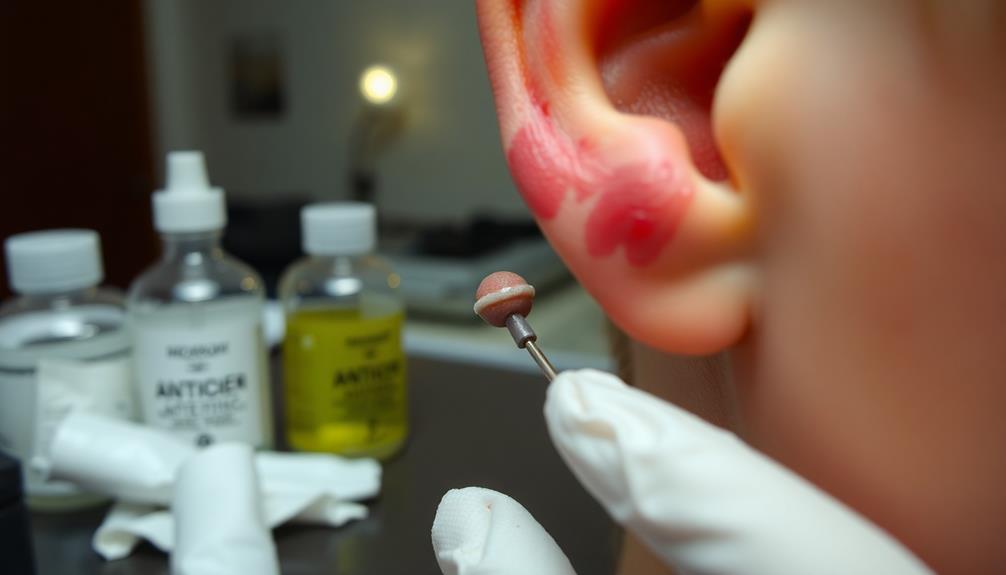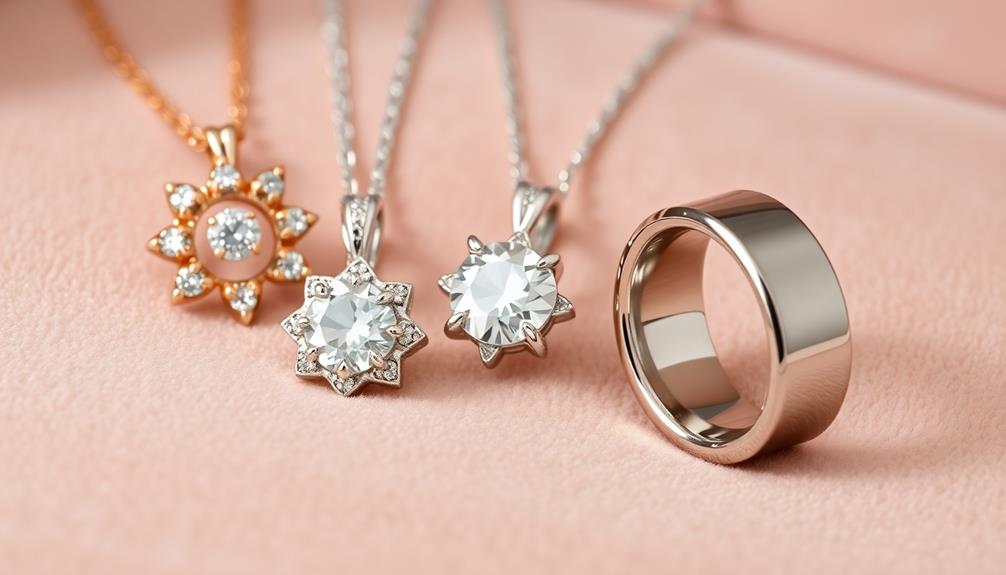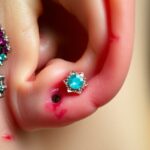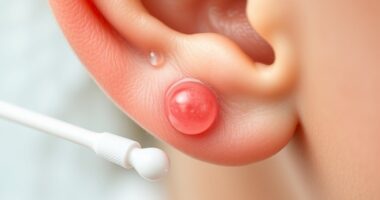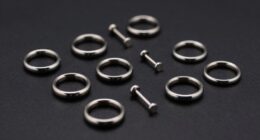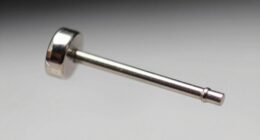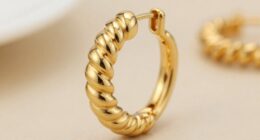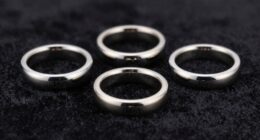When considering a body piercing, be aware of potential risks like infections, allergic reactions, and dental trauma. Infections can arise from unsanitary practices and may lead to serious health issues. You might also experience allergic reactions to certain metals, especially nickel. Oral piercings can damage your teeth and gums too. To minimize these risks, make certain you choose a qualified piercer and follow proper aftercare guidelines. Regularly check for signs of infection and maintain good hygiene. By understanding these factors, you can make informed decisions about piercings. Stick around for more helpful tips to make certain a safe piercing experience.
Key Takeaways
- Body piercings can lead to infections, including localized infections and serious systemic infections from contaminated equipment.
- Allergic reactions to jewelry, often from nickel, can cause dermatitis requiring treatment and jewelry removal.
- Oral piercings may result in dental trauma, such as tooth chipping and gum damage, necessitating dental repair.
- Keloid formation can occur at the piercing site, especially in individuals with a history of keloids.
- Proper aftercare is crucial to prevent complications, including regular cleaning and monitoring for signs of infection.
Understanding Complications

When you get a body piercing, it's important to understand the potential complications that can arise. Localized infections are among the most common issues, often presenting with redness, swelling, and pus-like discharge.
Maintaining proper hygiene is essential to prevent these infections, and if they occur, you might need antibiotic treatment.
You should also be aware of systemic infections, such as hepatitis B, hepatitis C, and tetanus, which can result from contaminated equipment. Getting immunizations before your piercing can greatly reduce these health risks.
Allergic reactions, particularly to nickel in jewelry, can cause dermatitis, requiring you to remove the jewelry immediately and possibly use steroid creams.
If you're considering oral piercings, know that they can lead to dental trauma, including tooth chipping and gum damage, which may require dental intervention.
Additionally, keloid formation is a risk, especially if you have a history of keloids. These raised scars can develop at the piercing site due to excessive scar tissue growth, making it crucial to weigh the risks carefully before proceeding with any body piercing.
Common Health Risks
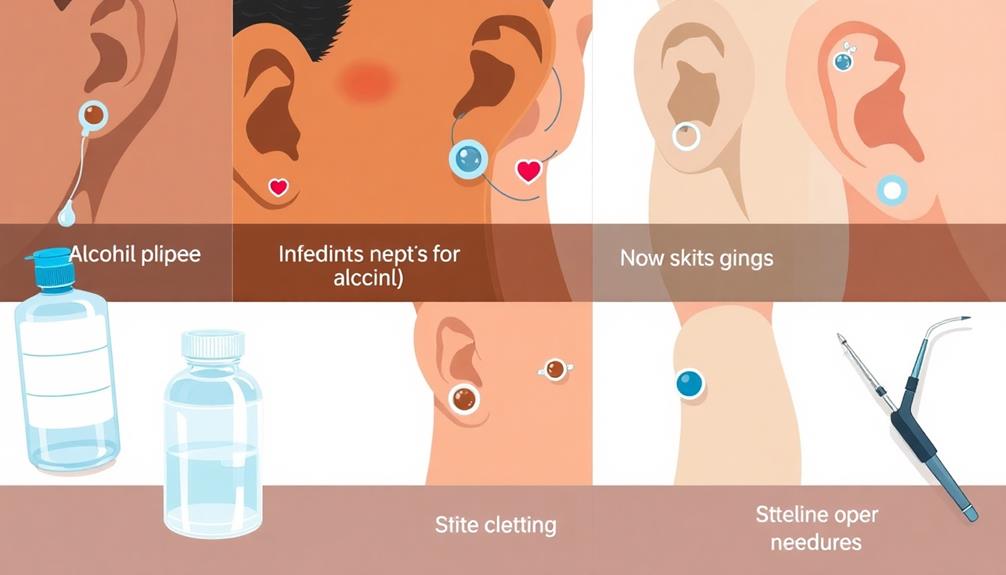
When you get a body piercing, you might face health risks like infections and allergic reactions.
These issues can lead to redness, swelling, and even serious complications if not addressed.
Additionally, oral piercings can result in dental trauma, making it essential to understand the potential dangers before you proceed.
Infection and Allergic Reactions
Body piercings can introduce several health risks, particularly infections and allergic reactions. If you neglect proper aftercare, you might experience local infections, which can manifest as redness, swelling, and pus-like discharge. In severe cases, these infections could require antibiotics.
Navel piercings, for instance, are especially prone to infection due to their location and irritation from clothing, making diligent aftercare essential.
Additionally, allergic reactions to jewelry, particularly those containing nickel, can lead to itching, redness, and swelling. If this happens, you'll need to remove the offending jewelry to alleviate symptoms.
Using hypoallergenic materials like surgical stainless steel, titanium, or high-quality gold can help reduce the risk of complications.
Be aware that infections can escalate, potentially leading to bloodstream infections, including hepatitis B and C, especially if contaminated piercing equipment is used.
This emphasizes the importance of ensuring the piercing studio follows strict hygiene protocols and that you're up to date on immunizations.
Oral and Systemic Issues
In addition to the risks of infection and allergic reactions, oral piercings pose unique challenges that can lead to both immediate discomfort and long-term health issues. If you get a tongue piercing, you might experience swelling that makes eating, speaking, and even breathing difficult during the initial healing stages.
It's important to also consider the potential impact of your diet on the healing process, as certain foods can exacerbate irritation around the piercing. For example, dogs may benefit from fresh, natural ingredients in their diet, which can also apply to your nutrition post-piercing.
More seriously, these piercings can lead to dental trauma, which includes chipped teeth and damaged gums that often require dental intervention.
Moreover, oral piercings can expose you to systemic infections if contaminated equipment is used. Serious conditions like hepatitis B, hepatitis C, and bacterial endocarditis can result from unsanitary piercing practices, highlighting the importance of sterile instruments and proper hygiene.
You should also be aware of allergic reactions to metals, particularly nickel, which is commonly found in body jewelry. Such reactions can lead to localized dermatitis and might require you to remove the jewelry altogether.
Understanding these risks can help you make informed decisions about oral piercings, ensuring you prioritize your health while expressing your personal style.
Preparation Before Piercing
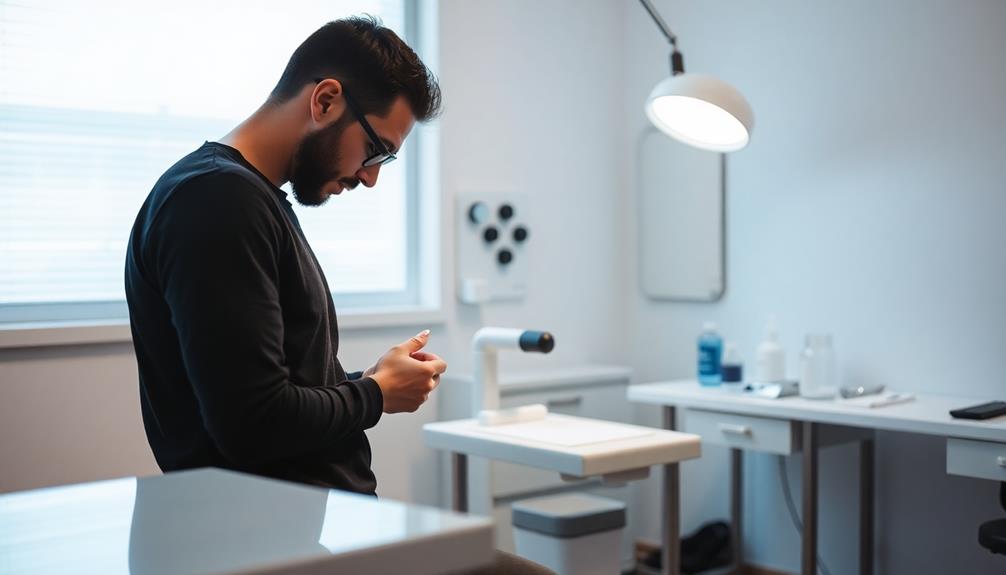
Before you get a piercing, take a moment to assess your personal readiness and think about any potential regrets.
It's also important to research the different piercing options available and understand their healing processes.
Personal Readiness Assessment
Evaluating your personal readiness for a piercing is vital to guaranteeing a positive experience. Before heading to the piercing studio, reflect on your motivations and potential feelings of regret. Impulsive decisions might lead to dissatisfaction later on. It's important to avoid external pressures from friends or peers; this choice should be yours alone.
Additionally, consider the following factors in your personal readiness assessment:
| Factor | Importance | Action |
|---|---|---|
| Motivation | Understand why you want it | Reflect on your reasons |
| Substance Use | Avoid impaired judgment | Stay sober before the appointment |
| Risk of Infection | Know the potential complications | Research hygiene practices |
| Aftercare Requirements | Guarantee proper healing | Learn what care is needed |
| Consulting with Friends | Gain insights from experiences | Talk to friends with piercings |
Research Piercing Options
Many people overlook the importance of researching piercing options, but doing so can greatly impact your overall experience. Before making a decision, consider your motivations and the potential regret that might follow. Guarantee your choice aligns with your personal values and desires, rather than succumbing to peer pressure or current trends.
It's vital to gather information about the specific type of body piercing you're considering. Different piercings heal differently, and knowing the aftercare requirements is essential for avoiding complications. Look for reputable studios that use fresh disposable equipment to minimize any risks during the procedure.
Additionally, be certain to refrain from alcohol or drugs prior to getting pierced, as they can cloud your judgment and lead to poor decision-making. Understanding the healing process and associated risks will help you prepare mentally and physically for the experience.
Taking the time to research piercing options can enhance your confidence and comfort level. This preparation sets you up for a smoother journey, enabling you to enjoy your new body art with peace of mind.
Consult Trusted Friends
Gaining insights from trusted friends can greatly enhance your piercing experience. When you consult trusted friends with piercing experience, you can gather invaluable information about pain levels, healing times, and effective aftercare routines. Ask them about the jewelry they chose; understanding how their skin reacted can help you avoid potential allergic reactions.
Here's a quick reference table to help you weigh different aspects based on their experiences:
| Aspect | Positive Feedback | Negative Feedback |
|---|---|---|
| Jewelry Material | Hypoallergenic options worked well | Allergic reactions to certain metals |
| Piercing Studio | Excellent hygiene practices | Poor professionalism of piercers |
| Aftercare Tips | Simple routines sped up healing | Complications due to neglect |
| Pain Level | Minimal discomfort reported | Intense pain for some piercings |
| Infection Risk | Rare infections; follow advice | Serious infections without care |
Discuss any complications they faced, like infections or scarring, to better understand the risks involved. Their advice on managing the healing process can guide you through a smoother journey.
Safety Measures to Consider
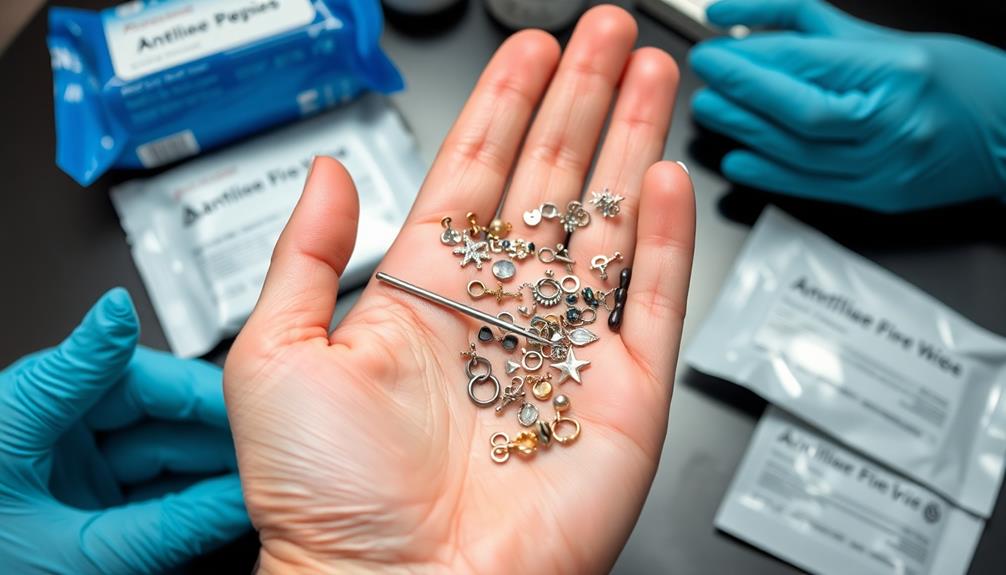
When it comes to body piercing, choosing a qualified and licensed piercer is vital to minimizing risks. A professional guarantees proper technique and follows strict sterilization protocols, which include using autoclaves for equipment and disposable gloves for every procedure. This not only helps prevent infections but also reduces the risk of bloodborne diseases like hepatitis B and tetanus.
Before you go ahead with the piercing, check that the studio uses single-use needles and properly disposes of them to avoid contamination. It's also a good idea to opt for hypoallergenic jewelry made from materials like surgical stainless steel, titanium, or gold. Such materials are less likely to cause allergic reactions and can promote a smoother healing process.
Additionally, make sure the piercing studio provides clear instructions on how to clean the piercing after it's done. Proper hygiene is vital for healing, so follow their guidelines closely.
Aftercare Guidelines

After choosing a qualified piercer and ensuring safety measures are in place, proper aftercare becomes key to a successful healing process. Follow these aftercare guidelines to minimize the risk of infection and promote healing for your new piercings.
Clean your piercings twice daily using a saline solution or a mild soap. Avoid harsh cleaners, as they can irritate your skin.
For oral piercings, rinse your mouth with an alcohol-free mouthwash after meals to maintain oral hygiene and reduce infection risk.
During the healing process, which typically lasts around six weeks or longer, avoid exposing your new piercings to water from pools, hot tubs, or natural bodies of water. This will help prevent infection and complications.
Keep your jewelry in place throughout the healing period; removing it too soon can disrupt the healing process.
Always monitor your piercings for signs of infection. Look out for excessive redness, swelling, or discharge, and seek medical attention if symptoms persist beyond a few days.
Resources for Further Information
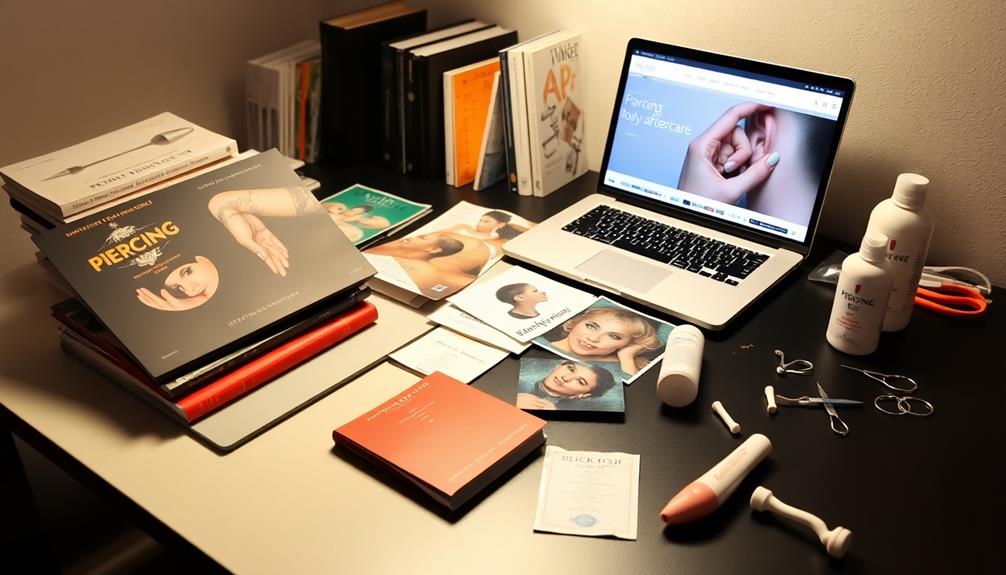
Accessing reliable resources is essential for anyone considering body piercings or looking to enhance their knowledge about aftercare and potential risks. Educating yourself can help you make informed decisions and guarantee a safe experience. Here are some key resources to check out:
| Resource | Focus Area | Website/Contact |
|---|---|---|
| Association of Professional Piercers | Directory of approved artists | [professionalpiercers.org](https://www.professionalpiercers.org) |
| American Academy of Pediatrics (AAP) | Guidelines for parents | [aap.org](https://www.aap.org) |
| National Library of Medicine | Health-related inquiries | [nlm.nih.gov](https://www.nlm.nih.gov) |
| Mayo Clinic | Safety and risks of piercings | [mayoclinic.org](https://www.mayoclinic.org) |
| Infection prevention and aftercare | Hygiene and care practices | Various health publications |
When seeking medical advice, always consult reputable sources. Learning about infection prevention and aftercare practices can dramatically reduce risks associated with body piercings. Remember, proper hygiene and understanding the processes involved are key to enjoying your new piercings safely.
Frequently Asked Questions
What Are the Complications of Body Piercings?
When you consider body piercings, you should be aware of complications like infections, allergic reactions, dental damage, bloodborne diseases, and keloids. Taking precautions helps minimize these risks, ensuring a safer piercing experience.
What Are Some Potential Health Impacts of Body Piercing?
Did you know nearly 20% of people with piercings experience complications? Body piercings can lead to infections, allergic reactions, or dental issues. It's essential you prioritize hygiene and choose safe materials to minimize health impacts.
What Is the Risk of Getting a Piercing?
When you get a piercing, you're exposing yourself to potential infections, allergic reactions, and even dental trauma. It's essential to choose a reputable piercer and follow aftercare instructions to minimize these risks.
What Are the Complications Associated With Intimate Body Piercings?
Did you know that about 30% of people with intimate piercings experience complications? You might face issues like pain, infection, or keloids. Proper care and hygiene are essential to minimize these risks and guarantee a safe experience.
Conclusion
In summary, while body piercings can be a fun form of self-expression, it's essential to be aware of the potential risks involved. Did you know that about 20% of people with body piercings experience complications? By understanding these risks and taking proper precautions, you can enjoy your new piercing safely. Make sure to follow aftercare guidelines and consult professionals to minimize any issues. Stay informed, and your piercing journey can be a positive experience!

